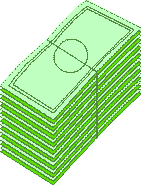Back
Your Recording Projectů..
Some notes by Geoff Francis
Introduction

|
These notes have been put together for one main reason - to help you, at the end of your recording project, to walk away with the best possible product - and the least possible amount of frustration, heartache and damage to your bank balance!
Whether this is going to be your first experience of recording or whether you're an old hand, I hope that you'll find something in this short guide that will be helpful. Please forgive me for any places where I go over ground with which you may be already familiar.
|
Budget
There's one golden rule about the costs of making a CD. It always comes to more than you think! That's usually because people overlook or underestimate one or more item. Here's a quick checklist:
|
|
|
1. The recording process.
This could include musicians' costs and will certainly include recording and storage media, studio time and a sound engineer. (Tip: If you really want to get the sound engineer off side, it's easy. Just keep on referring to her or him as a "mixer".) Depending on such factors as the complexity of your arrangements, time needed for post production work, including sound contouring, mixing and mas-tering could be two or three times as much as that used for re-cording.
|

|
2. Copyright.
Not a problem if it's all your own material, but beware the wrath of APRA and AMCOS if not. Even songs that you think are in the public domain (usually trad or anon) will need to be cleared with them. Ideally, you should contact them at least 3 months before you plan to have your CDs ready. They work on a basis of 6.25% of anticipated revenue (plus a small administrative charge!). Example: You're going to press 500 CDs of John Lennon songs which you expect to sell at $25 each. "OK," says AMCOS. "500 times $25 = $12,500. We'll have $800 of that please - up front and in advance before we'll give you a license to even press the recordings!" Never has writing your own material looked a more attractive proposition!
3. Artwork.
You might have a mate who can do this for you, or you might use a profes-sional. And then the CD covers and inserts will need printing. Photocopying is fine for small runs (say, up to about 50 or 100). Much more than that and printing be-comes cheaper.
4. Pressing the CDs.
The unit cost will vary hugely depending on how many you have made. For a run of 500, expect to pay about $2.00 per CD. For a run of less than 100, expect to pay up to $10 per CD. Not fair? It sure ain't but that's the way it is!
5. Contingencies.
After you've worked out all your likely costs, add on at least 15%. What for? Buggered if I know, but you'll almost certainly need it.
|
How much can you expect to spend in total? This is determined by many factors. How much studio time will you need? (This will depend, amongst other things, on how well rehearsed you are and how many parts you need to record). Will you have to pay copyright fees? Are you going to include a 16 page booklet with the CD or just a card? Do you want full colour or just two colour printing? But, as a rough guide, for a budget run of 500 CDs, all your own material, don't expect much change out of $2,500 to $3,000.
The Recording Process
There's one common mistake that, astonishingly, almost everybody makes - in-cluding experienced musicians, when it comes to recording - being underprepared. "We don't need to waste any more time rehearsing that song - we've played it before hundreds of times." But playing a song live in a crowded, noisy pub isn't the same as being in an empty studio where suddenly you feel horribly exposed! Bring a copy of all lyrics with you - no matter how well you think you know them. Don't get to the studio and find you've left your guitar tuner or favourite lead at home! On top of all this, you'll be amazed at how the time flies! What? It's 11:00 pm already - and we haven't even finished the first song yet!
Don't underestimate how much recording will take out of you. Arrive at the studio on time, fresh, sober and in top condition. No matter how experienced you are, the recording environment is artificial and can be a stressful one. If you are using guest musicians, a few hours spent recording a quick demo first (for them to listen and practice to) can save many more hours later. Some are naturally more at ease in a studio than others but in any event ask yourself these questions:
Do I really want to pay good money to a sound engineer to sit and watch me putting a new set of strings on my guitar, or working out our chord progressions or key changes and arrangements, or writing out song words, just because I came under prepared?
Do I want to have to settle for a second best performance on my CD just because lack of practice means I'm blowing my recording budget?
Do I really want to put myself and (if appropriate) others through the mentally and physically draining process of doing take after take just because we didn't rehearse more?
Some other tips which can help make the recording process an enjoyable one:
Understand that for a top quality outcome, everything has to be done as well as possible - and that includes all aspects of the sound engineering! Matters such as microphone placement and sound level checks are absolutely essential to getting a good result. It takes you time to tune your instruments and to get ready. Likewise, to get a quality recording, you can't cut setup corners! Beware the fatal words, "We can cover that up in the mix!" Bad mixing is seldom the answer to bad musicianship! There's a limit to what you can sensibly "cover up" in a mix - and it's not much! A few minutes more spent recording the part properly can save a lot of time, frustration, disappointment and cost later.
|

|
Use a count-in before recording. You'll find it essential if you're over-dubbing tracks later. If it's not needed it can easily be taken out at the end.
Keep absolutely quiet and still for a few seconds after you think you've finished laying down a track. The decay of your instrument (which you might not even be able to hear), might be being recorded. Certainly, you won't want to record the "clonk" as you bang your guitar on the mike stand! The recording engineer will indicate when it's safe for you to start breathing again!
Don't worry too much if you make some mistakes while you're playing. Sounds odd? What I mean is, unless you've really blundered, or unless you're asked to stop, it's often better to keep going - and listen to it afterwards. Remember that you can always do it again if necessary. It's surprising how often the mistake is in your mind - not on the recording! And even if there is something that needs changing, it might be possible to simply "drop in" on the offending passage.
Post Production

|
The post production process can be broken down into a number of stages, every one as important as every other. The best results will be obtained if you are able to work closely with the sound engineer especially in the earlier stages. No matter how experienced and skilled the engineer, she/he will need your input in order to achieve the sort of sound that you want. Here's a tip though: try to involve the band in this only as much as is absolutely unavoidable - unless you're looking for a great excuse to break the band up. Musicians who don't want their own instrument turned up higher in the mix are about as rare as three legged unicorns.
|
This summary of the post production stages is over simplified and not fully comprehensive. Bear in mind that every job is different, and the process is always iterative.
Getting a Good Clean Sound
The first part of the post production is to make the sound as clean and fresh as possible. This can include, for example, getting rid of those strange grungy noises that sometimes mysteriously get into recordings, brightening up a rather muddy sounding guitar, or fattening up thinnish vocals. This is when we slay the twin vocal dragons of sibilance and explosives. This stage build the solid foundations of good post production. But it is not the time to decide on which instruments should be featured in which breaks. That comes later!
Creating The Musical Stage
Depending on how complex your arrangements are, we may need to build a "virtual stage" for your recording. This involves positioning instruments more to the left or the right, and more to the back or closer to the front. We lay the foundations for, for example, an intimate sound or a big theatre sound? And, no, it's still not the time to decide on which instrument should be featured in which breaks!
Weaving The Musical Magic
This is where we turn the recording into something exciting and interesting, something that the listener will want to play over and over again. This is where we use the wonders of technology to "build" the songs. This is where different parts are brought in or out, faded up and down, brought forward and backward in the mix, often weaving in and out of the song. This is definitely where we lock the band out of the room. And, yes, this is the time to decide on which instrument should be featured in which breaks.
But Wait - There's More!
Now that we've got our three-dimensional sound flying along nicely, we can add the zest and the sparkle - some reverb here maybe, a touch of delay or chorus there, and how about a bit more stereo imaging? The possibilities are amazing.
Mixdown and Mastering
With everything ready, we can mix down our songs. Then we listen. Some will sound louder than others. Some a bit more toppy, some a bit boomy. This is where we put them through the mastering process to make them sound like an album - not just an assortment of songs!
That's just about all there is to it really - happy recording!
The author of this document, Geoff Francis, is owner and head recording engineer at Huon Delta Studios, Franklin, Tasmania, phone 03 6266 3010, e-mail glazfolk@trump.net.au
Back



